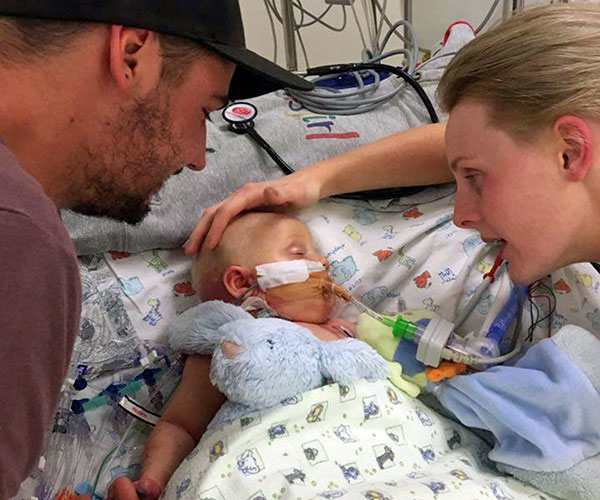When father-of-two Jacob Clift woke up on Boxing Day feeling unwell, he assumed he had a case of gastro. He had no idea, that in less than 12 hours, he would be in the back of an ambulance, fighting for his life against meningococcal disease.
The 28-year-old slept through boxing day, waking up later in the night when he fainted twice, was vomiting, had a fit and becoame badly disoriented.
His family called an ambulance and by the time help arrived his lips had turned blue

Jacob Clift has shared his horrifying battle with meningococcal.
During the five-minute trip to Armadale Hospital Mr Clift started to develop a deep purple rash and when he arrived at the hospital his organs had started to fail and he was put on life support.
Mr Clift was diagnosed with meningococcal meningitis and septicaemia. His family were told he would not make it through the night.

During a 5-minute trip in the ambulance, the 28-year-old’s body became covered in a purple rash.
Remarkably, Jake did make it through the night however, at this stage he was in an induced coma, his liver and kidneys had failed, an artery in his heart was not pumping blood, his lungs had collapsed and his legs, arms, nose and ears were turning black from a lack of oxygen. His chance of survival was very low.
“He wasn’t ready to go. He’s definitely a fighter,” Mr Clift’s brother Travis told Seven News.

Because Mr Clift’s lungs collapsed his legs, arms, nose and ears were turned black from a lack of oxygen. Tragically his hands and legs below the knee had to be amputated.
Mr Clift woke up to see his family for the first time since his medical ordeal of January 5.
In February, he was transferred to Fiona Stanley Hospital and although the meningococcal virus had been beaten the damage to his body was irreversible.
Mr Clift’s hands were amputated, as were his legs, 15cm below the knee, and he faced numerous skin grafts and dialysis.
“Jacob has shown an enormous amount of courage, determination and resilience. He has defied all odds and as a father to two beautiful girls he has showed them what true strength really is,” writes Mr Clift’s supporters on a GoFundMe page created to fundraise for financial support.

He wasn’t expected to survive, but this dad is a fighter and now he has a message for everyone.
Mr Clift is getting ready to return home, however he has and his family have an message for everyone – get vaccinated.
It’s unsurprising Mr Clift assumed he had a common bug and not meningoccal as in its early stages the disease is almost impossible to distinguish from a cold or virus.
What is meningococcal disease?
According to Meningococcal Australia meningococcal disease is an acute bacterial infection that can cause death within hours if not recognised and treated in time.
In Australia there are 5 main strains of the disease, all of which now have vaccinations available from your doctor.
The meningococcal bacteria are spread through droplets from the nose or throat through sneezing or coughing.
Figures show that between 2000 and 2002, 522 children under the age of four were admitted to hospital with meningococcal disease. It’s treated with antibiotics but even with urgent attention, about 10% of those with the illness die. Others can be left with a permanent brain injury and deafness.
Signs and symptoms meningococcal
Parents have been made well aware of the red rash associated with meningococcal disease – it’s the one which doesn’t fade when pressed with a glass. Even though it’s an important symptom of the illness, it often means the illness is already well underway.
“It’s a good sign of meningococcal disease, but you’d also like to pick it up before you get that rash,” says paediatrician Dr Jenny Royle.
Other signs to look out for include fever, irritability, extreme tiredness, vomiting, turning away from the light and drowsiness.
“In young babies it’s good to have a low index of suspicion with an unwell child with a fever,” says Dr Royle.
“Parental worry about children is often very helpful and accurate. If you’ve been to the doctor and sent home, and your baby’s getting worse, or not getting better, parents should act on their own sense of worry and get the child re-checked.”
It’s also crucial to make sure vaccines are given on time, not delayed, or the consequences can be tragic.
“You don’t want to have your vaccines late, you want to get them as soon as they are due… that’s really the best thing you can do for preventing meningitis. We have seen cases in families who delayed, and that is really bad.”
For more information on meningococcal and vaccinations visit, Meningococcal Australia and be sure to make an appointment with your GP to check to discuss vaccinations.

